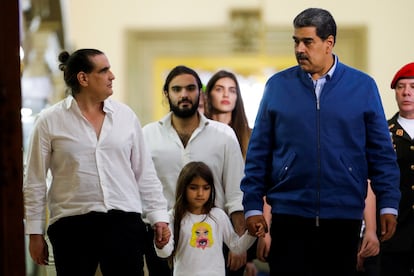Release of Alex Saab widens Venezuela’s options for political action
The Maduro ally has gone from being a businessman involved in alleged acts of corruption to being viewed as a hero, despite the fact that he collaborated with U.S. authorities. The Chavismo government sees his release as a victory

In the recent prisoner swap between Venezuela and the United States, Alex Saab — an ally of the Venezuelan government and DEA informant, who was being tried in the state of Florida for alleged money laundering — was returned to Venezuela in exchange for 10 Americans imprisoned in the South American country, including mercenaries Airan Berry and Luke Denman — who were serving sentences in Caracas for their role in Operation Gideon, which tried to overthrow Maduro — and a fugitive nicknamed Fat Leonard, who defrauded the U.S. Navy. At least 17 Venezuelan political prisoners have been released as part of the agreement. The deal was celebrated by different sectors, who believe that the Barbados accords — a commitment signed last October — are showing results.
Saab was the jewel in the crown of the Maduro government. Since his arrest in 2020 in Cape Verde, the Chavista administration has been campaigning for his release. He was made a diplomat and included in the Venezuelan delegation during negotiations in Mexico. Saab has gone from being a businessman involved in alleged acts of corruption in connection with the Venezuelan government — as documented by the investigative journalism portal Armando.Info — to being propagandized as a hero, despite the fact that he collaborated with U.S. authorities. The Venezuelan government sees his release as a victory.
Human Rights organizations, meanwhile, are pleased about the release of political prisoners in Venezuela, including six union leaders who were sentenced to 16 years in prison last August.
One of the questions being asked now is what else can happen in Venezuela, which has turned into a kind of international political thriller since the White House decided to change its policy of maximum pressure.
The new U.S. strategy is seeking to promote agreements between the Maduro government and the Unitary Platform, an alliance made up of Venezuela’s opposition parties. At the same time, Caracas and Washington are reaching bilateral agreements to curb the massive migration of Venezuelans to the southern border of the U.S., which will hold presidential elections next year.
For journalist Blanca Vera, Maduro must now focus on his survival. “The release of Saab means that electoral agreements are being complied with,” she comments.
With relaxed sanctions, the Maduro government needs to raise money quickly and that can only be achieved through the oil industry, explains Vera. She also believes that Saab’s release demonstrates Maduro’s negotiating ability.
Such a feat was considered impossible as Saab was still awaiting trial. The Biden administration had to grant the businessman-diplomat clemency for him to be released. This same recourse was used in a prisoner swap in September 2022 to release two of Maduro’s nephews, who were serving an 18-year sentence in New York for drug trafficking.
In the political arena, the Barbados accords set down the necessary conditions to hold presidential elections in 2024. Some steps have already been taken in that direction. For example, there is now a clear procedure for candidates who have been disqualified from running for office to appeal that decision. Opposition candidate María Corina Machado unexpectedly went to the Supreme Court on Friday, December 15, to file a request calling on the court to protect her right to run in the election.
For Geoff Ramsey, from the Atlantic Council, the United States has secured the release of 30 people in exchange for just one, which is a clear commitment to the negotiation process. He adds that Saab’s presence in Venezuela may spark discomfort within the Chavismo political movement, due to his role as a collaborator with the DEA. Vera has a similar opinion.
Once the excitement over the Maduro government’s controversial referendum on annexing the Essequibo region dies down, the ball will be in Chavismo’s court, and it is up to it to respond. They will most likely resort to their most-used tactics: buying time, directing new revenue to public spending, trying to improve the government’s image, seeking support from the economic sectors and sparking divisions in the opposition. The other common strategy is selective repression and arresting political prisoners as bargaining chips. However, as the election draws nearer, there may not be enough time left for economic measures to boost the government’s popularity. As a result, the range of options for political action in Venezuela is continuing to widen.
Sign up for our weekly newsletter to get more English-language news coverage from EL PAÍS USA Edition
Tu suscripción se está usando en otro dispositivo
¿Quieres añadir otro usuario a tu suscripción?
Si continúas leyendo en este dispositivo, no se podrá leer en el otro.
FlechaTu suscripción se está usando en otro dispositivo y solo puedes acceder a EL PAÍS desde un dispositivo a la vez.
Si quieres compartir tu cuenta, cambia tu suscripción a la modalidad Premium, así podrás añadir otro usuario. Cada uno accederá con su propia cuenta de email, lo que os permitirá personalizar vuestra experiencia en EL PAÍS.
¿Tienes una suscripción de empresa? Accede aquí para contratar más cuentas.
En el caso de no saber quién está usando tu cuenta, te recomendamos cambiar tu contraseña aquí.
Si decides continuar compartiendo tu cuenta, este mensaje se mostrará en tu dispositivo y en el de la otra persona que está usando tu cuenta de forma indefinida, afectando a tu experiencia de lectura. Puedes consultar aquí los términos y condiciones de la suscripción digital.








































